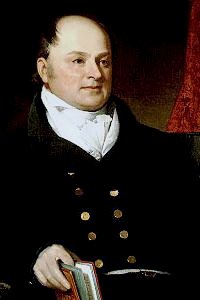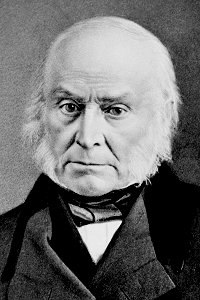Introduction

Born: July 11, 1767, Braintree, Massachusetts.
Died: February 23, 1848, Washington, DC.
Buried: United First Parish Church, Quincy, Massachusetts.


Born: July 11, 1767, Braintree, Massachusetts.
Died: February 23, 1848, Washington, DC.
Buried: United First Parish Church, Quincy, Massachusetts.

John was the son of John Adams, second president of the United States, and Abigail Smith, and husband of Louisa Catherine Johnson.
John the younger went on to become was the sixth president of the United States. He wrote a metrical version of the psalms, as well as several hymns. His diary entry for June 29, 1845, reads:
Mr. Lunt preached this morning from Ecclesiastes iii. I,
To everything there is a season and a time for every purpose under heaven.He had given out as the first hymn to be sung the 138th of the Christian Psalter—his compilation, and the hymn-book now used in our church. It was my version of the 65th Psalm; and no words can express the sensations with which I heard it sung.
Were it possible to compress into one pulsation of the heart the pleasure which, in the whole period of my life, I have enjoyed in praise from the lips of mortal man, it would not weigh a straw to balance the ecstasy of delight which streamed from my eyes as the organ pealed and the choir of voices sung the praise of Almighty God from the soul of David, adapted to my native tongue by me.
After Adams’ death, some of his verse was published in Poems of Religion and Society by John Quincy Adams, by John Davis and T. H. Benton (New York: William H. Graham, 1848). A sample from that book:
Sure, to the mansions of the blest
When infant innocence ascends,
Some angel brighter than the rest
The spotless spirit’s flight attends.
On wings of ecstasy they rise,
Beyond where worlds material roll
Till some fair sister of the skies
Receives the unpolluted soul.
There, at the Almighty Father’s hand,
Nearest the throne of living light,
The choir of infant seraphs stand,
And dazzling shine, where all are bright.
That inextinguishable beam,
With dust united at our birth,
Sheds a more dim, discolored gleam
The more it lingers upon earth.
Closed in this dark abode of clay,
The stream of glory faintly burns,
Not unobscured the lucid ray
To its own native fount returns.
But when the Lord of mortal breath
Decrees His bounty to resume,
And points the silent shaft of death
Which speeds an infant to the tomb—
No passion fierce, nor low desire,
Has quenched the radiance of the flame;
Back to its God the living fire
Returns, unsullied, as it came.
John Quincy Adams (1767–1848)